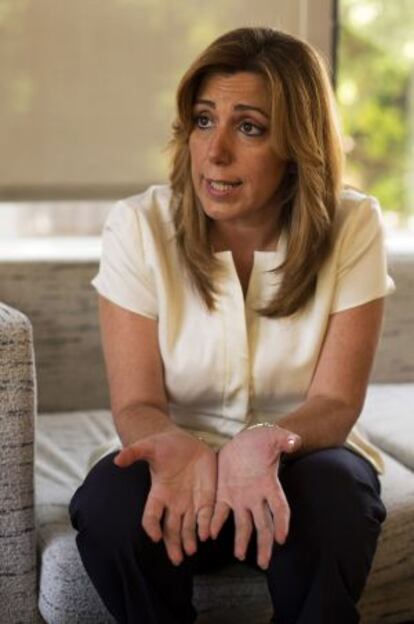A climber of political heights
The Socialist Party candidate is ready to become Andalusia's first woman regional premier

At nearly 39 years of age, Susana Díaz Pacheco is getting ready to climb her first eight-thousand-feet political peak. This woman who built most of her résumé inside Socialist Party (PSOE) offices rather than government agencies is a natural-born political climber. She was selected by outgoing Andalusian premier José Antonio Griñán to replace him as the Socialist candidate in the next regional elections, and received massive support at last month’s primaries where she was the only candidate in the running, but still needed backing from voting members at the caucus.
So now, the climber from Triana — a neighborhood of Seville famous for producing flamenco performers — is ready to reach the highest summit yet: becoming the first woman to preside the regional government of Andalusia.
Although Griñán’s sponsorship was a powerful tool, Díaz received support from all Socialist provincial leaders save one, who remained silent. This kind of consensus can be credited to Díaz herself. She has spent the last three months on the road, talking up people and trying to garner support from party members who didn’t even know at that point that there would be express primaries in June.
Díaz is dogged by a clichéd image of herself as a tough woman, a description she started earning when she joined the PSOE’s youth group, Juventudes Socialistas. She was the organizational secretary for that association, and later also for the Seville branch of the party, which happens to be the stronghold of the Andalusian Socialists and one of the most influential branches of the Socialist Party as a whole.
She’s tough, yes, but no more and no less so than many Socialist leaders”
The Sevillian Socialists are grouped into a multitude of tribes, and its members are promiscuous, tending to change sides every time they smell a party congress coming. But a majority of them now consider Díaz their leader.
She was a councilor and deputy mayor for the city of Seville from 1999 to 2004, a congress member between 2004 and 2008, a regional assemblywoman since 2008, a senator appointed by the regional government in 2011-2012, and for the last 15 months she has also headed the Andalusian premier’s office.
“She’s tough, yes, but no more so and no less so than many other Socialist leaders,” says one source. She uses the same weapons as her male colleagues, because she knows how to use them. But what makes her different from other women who have held positions of responsibility in the party is that she has not been co-opted by anyone. “She is the most powerful woman in the entire history of the Andalusian Socialist Party, and she has power of her own,” says one member of the regional government.
Ever since Griñán appointed her chief of the premier’s office, Susana Díaz has tried to shed that image of hers that seems to go best with the soundtracks of Kill Bill: Volumes 1 and 2.
“She has always gone out there to win no matter what, and when you are in government you see things differently. She has learned to negotiate, and when you’re in a coalition government you have to be in a permanent state of negotiation with IU [United Left, the PSOE’s governing partner in the region],” says one Socialist leader who has known Díaz since she was a little girl.
“She has started to ask for other people’s opinions, and she has learned a lot,” they add. Some people claim that Griñán’s attitude towards her has something of My Fair Lady about it: he allegedly recommends books and movies to improve her education. Other people disagree, and say it’s not Griñán who is effecting change in her, but the government position she now holds.
Her first move after becoming the Socialist Party’s official candidate in the next Andalusian elections was to confirm that she and IU will maintain the coalition agreement that has enabled both parties to govern the region despite the fact that the opposition Popular Party obtained the most votes at the March 2012 elections.
In her first speech in her new capacity, Díaz asked party members for support in “this new period” in order to bring “stability” to the party and the government.
Díaz is daring, but she never loses her head. And she is straightforward with the people she talks to, whether they be powerful or not. By her second sentence she may already be calling you darling, precious and dear. And other things, too.
Tu suscripción se está usando en otro dispositivo
¿Quieres añadir otro usuario a tu suscripción?
Si continúas leyendo en este dispositivo, no se podrá leer en el otro.
FlechaTu suscripción se está usando en otro dispositivo y solo puedes acceder a EL PAÍS desde un dispositivo a la vez.
Si quieres compartir tu cuenta, cambia tu suscripción a la modalidad Premium, así podrás añadir otro usuario. Cada uno accederá con su propia cuenta de email, lo que os permitirá personalizar vuestra experiencia en EL PAÍS.
¿Tienes una suscripción de empresa? Accede aquí para contratar más cuentas.
En el caso de no saber quién está usando tu cuenta, te recomendamos cambiar tu contraseña aquí.
Si decides continuar compartiendo tu cuenta, este mensaje se mostrará en tu dispositivo y en el de la otra persona que está usando tu cuenta de forma indefinida, afectando a tu experiencia de lectura. Puedes consultar aquí los términos y condiciones de la suscripción digital.









































